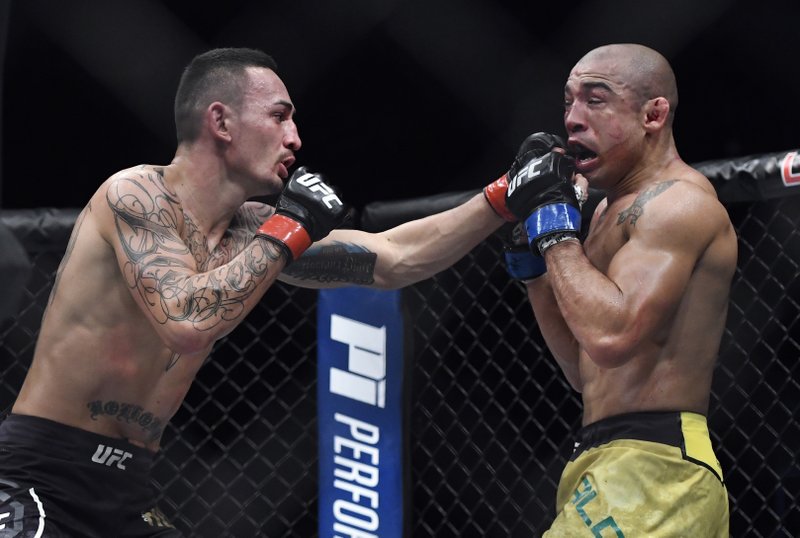
LAS VEGAS (AP) — Max Griffin isn’t proud of his reaction after he heard UFC featherweight champion Max Holloway dropped out of his fight against Brian Ortega with apparent symptoms of a concussion.
“To me, we’re fighters,” said Griffin, a UFC welterweight. “We always have a concussion, you know?”
Griffin knows his instinctive skepticism about Holloway’s injury isn’t healthy. He also isn’t afraid to acknowledge the fundamental illogic behind all mixed martial arts fighters’ decision to pursue a career in a sport that is designed to hurt them.
“We always have concussion-like symptoms, (but) I’ve been in fights where I couldn’t see, and I didn’t say, ’I can’t see,’” Griffin said Thursday. “We have concussions all the time. Like all the time. We have mild ones from getting hit, even not getting hit. You’ll be just kind of woozy today, or whatever. You just fight.”
Griffin knows people who have suffered or died from brain injuries, and he missed a fight last year after a training drill against a heavyweight led to a broken rib that nearly punctured his lung. He also quit his steady corporate job at Blue Shield of California in January to pursue MMA as a full-time occupation.
For any pro fighter, the financial and competitive rewards are simply stronger than the risks.
“If I’ve got a fight, I’m fighting,” said Griffin (14-4), who takes on Curtis Millender at UFC 226 on Saturday. “If you’re going to wheel me out there, put me in a wheelchair and drop me in there, I’m going to fight, dude.”
The fighters on the UFC 226 undercard reacted to Holloway’s absence Thursday with a mix of concern, disappointment and calculated obliviousness. He made two trips to the emergency room this week after his coaches and management noticed he was acting unusually, speaking strangely and struggling to awake from a nap.
“It’s extremely scary,” said Anthony Pettis, the former UFC champion who lost a title fight to Holloway in December 2016. “That’s life-changing. I love fighting, but I love my life more. You get concussion syndrome, and you literally can’t look at your phone or drive at night. I want to do be a fighter, but that changes your life forever.”
Indeed, developing the mindset of a successful MMA fighter is literally about believing you can avoid getting hurt, since that would mean your opponent is succeeding.
“Yes, I am a risk-taker,” welterweight Mike Perry said. “I believe there’s a lot of money in risk. Risk equals reward. Let’s go get paid.”
Perry — who has his nickname, “Platinum,” tattooed above his right eye in a cursive green script — is a wild man even by MMA’s heightened standards, and he shares Griffin’s raised-eyebrow curiousness about the seriousness of Holloway’s injury. Perry also reaped a benefit from Holloway’s absence in this merciless sport: His bout against Paul Felder was elevated to the pay-per-view portion of the UFC 226 card.
Yet Perry expressed support for Holloway’s decision, and he fully realizes he’ll eventually pay for his own reckless mentality in the cage.
“I’m waiting to see what happens to me, because I get hit, but I kind of like it,” Perry said. “I can take a shot. I’ve got that platinum cranium.”
Perry epitomized many MMA brawlers’ mindset when he acknowledged that he sometimes “got bored” in training camp before he moved to a new gym this year.
“So I started getting punched in the face, because it made me feel like I was having more fun or something,” Perry said with a grin. “It made me feel alive.”
As with many brain injuries in the cloistered world of combat sports training camps, it’s unclear when Holloway’s symptoms began or what caused them. UFC President Dana White said Holloway is still being examined to determine the root of his problem.
“Some people think it’s concussion-related, and some people think it’s weight cut-related,” White said. “According to him, he feels fine. But he doesn’t feel fine. There’s no way he’s going to fight anytime soon.”
Ortega won’t fight a replacement opponent at UFC 226, his manager confirmed Thursday. The UFC attempted to book several replacement bouts, possibly for an interim title, but Ortega elected to preserve his health and his title shot.
Many fighters also wondered aloud whether Holloway’s problems were related to his weight cut — the torturous process of dropping pounds in the last few days before a bout. Holloway attempted a severe cut in March to fight Khabib Nurmagomedov for the lightweight title on six days’ notice, but was pulled out by his doctors when his health declined.
Holloway’s representatives said he hadn’t even started the serious deprivation necessary for the final cut, but veteran fighters still know all about the disruption caused by each step in the process, which has led to deaths in MMA and boxing.
Weight cut dangers are an urgent topic throughout combat sports, and the UFC has tried safety measures, including early weigh-ins. Nothing has stopped fighters from stretching their bodies to the limit, preferring to take another risk in a profession that demands the acceptance of daunting odds.
“It’s only a matter of time until something really bad happens in the UFC to one of us,” lightweight Michael Chiesa said. “(Holloway) is a guy like myself that has to put himself through the wringer to make weight. I just can’t imagine what would have happened if he had thrown himself in a hot bath and really depleted himself.
“I’m sure he didn’t willingly take himself out of the fight. I’m sure they had to make the decision for him.”










